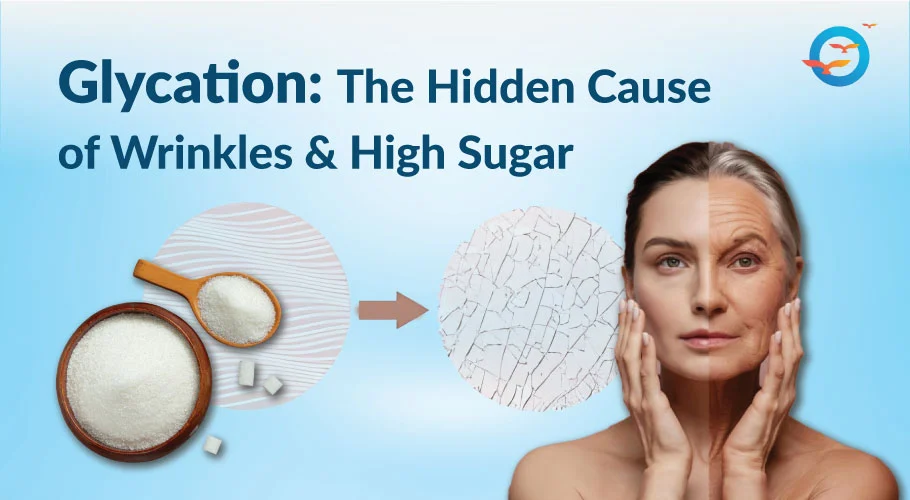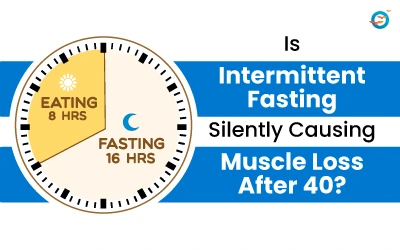Glycation: The Hidden Cause of Wrinkles & High Sugar

Ever wondered why some people show signs of aging sooner even when they eat “okay”? One hidden culprit is glycation. This slow, sticky process happens inside your body every day, but if you’re living with high blood sugar or eating a lot of processed food, it speeds up dramatically. Understanding it can help you look and feel younger for longer.
What is Glycation?
In simple words, glycation occurs when sugar molecules attach to proteins and fats in your body without the help of enzymes. This reaction creates harmful compounds called Advanced Glycation End Products (AGEs). These AGEs damage collagen, stiffen arteries, slow cell repair, and accelerate aging. People with diabetes are especially vulnerable because glycation and diabetes go hand in hand. Chronic high glucose means more AGEs in less time.
How Glycation Ages You Faster?
Excess AGEs weaken skin elasticity, making wrinkles appear earlier. They also harden blood vessels, increasing the risk of heart disease, kidney problems, and nerve damage. This is why experts call it “sugar rust.” When you manage blood sugar, you’re not only preventing complications, you’re slowing glycation ageing throughout your body.
Foods & Habits That Increase Glycation
Your diet and cooking style directly influence how much glycation happens inside you.
- Foods that cause glycation include sugary snacks, white bread, deep-fried foods, grilled meats, and processed foods high in fructose.
- People often ask, “does fruit cause glycation?” Whole fruits in moderation are less of a problem because fiber slows sugar absorption. Fruit juices and sugary syrups, however, can spike AGEs.
- High-heat cooking, smoking, and chronic stress also add fuel to the fire.
How to Stop Glycation Naturally?
The good news: you can slow this process.
- Focus on an anti-glycation diet: Vegetables, whole grains, spices like turmeric and cinnamon, green tea, and berries. These foods fight oxidative stress and reduce AGEs.
- Change your cooking methods: steam, boil, poach, or stew instead of fry or grill. This lowers Advanced Glycation End Products diet load drastically.
- Sleep and stress management matter. Studies show good sleep and regular activity lower post-meal glucose and help your body clear AGEs faster if you’ve ever wondered “does sleep reduce glycation?”, the answer is yes.
Can Glycation Be Reversed?
While you can’t undo all existing AGEs, you can reduce their buildup and improve your body’s repair mechanisms. Research published in Diabetes & Metabolic Syndrome and Journal of Clinical Biochemistry and Nutrition suggests that antioxidant-rich diets and blood sugar control help reverse glycation damage over time. In other words, your lifestyle is your strongest anti-glycation tool.
Glycation and Diabetes: The Strongest Link
Chronic hyperglycemia accelerates AGEs more than anything else. By keeping glucose steady, people with diabetes dramatically cut their risk of premature aging, skin damage, and organ complications. Managing sugar isn’t just about avoiding complications, it’s about protecting your skin, heart, and brain from the inside out.
Putting It All Together: Your Anti-Glycation Lifestyle
Every small change counts. Reduce high-heat cooking, cut processed sugar, choose autophagy-promoting foods like green vegetables, and prioritize sleep and stress control. Over time, these habits form a shield against glycation and aging, helping you look younger and stay healthier.
Curious about autophagy, the body’s natural healing switch? Explore our blog to learn more.
FAQs
1. What is glycation in the body?
It’s when sugar binds to proteins/fats forming AGEs, which damage tissues and speed aging.
2. How does glycation make you age faster?
AGEs stiffen skin and blood vessels, weaken repair, and trigger inflammation.
3. What foods increase glycation in the body?
Sugary snacks, refined carbs, fried and grilled foods, and high-fructose syrups.
4. How can I reduce glycation naturally?
Lower sugar spikes, eat antioxidant-rich foods, change cooking methods, and sleep well.
5. Can glycation be reversed?
Existing AGEs are hard to remove, but you can slow or stop new formation.
6. Is glycation linked to diabetes?
Yes, high blood sugar accelerates AGEs and related complications.
7. Does sleep reduce glycation?
Quality sleep improves glucose control and reduces oxidative stress, slowing AGEs.
8. Which antioxidants fight glycation?
Green tea, turmeric, cinnamon, berries, leafy greens, and vitamin C-rich foods.

